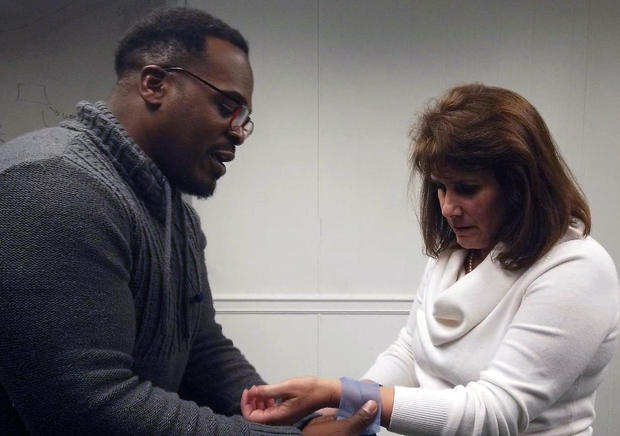This grad student started college behind bars. Now he’s giving back.
Dameon Stackhouse was six years into his prison sentence when he learned he would have a shot at earning his college degree. He was 37 years old and sitting inside East Jersey State Prison.
“You hear things, and over time, you’re just disappointed so many times,” Stackhouse told CBS News. “But I’m optimistic, so whenever something is presented to me, I jump clean on it whether it’s real or not.”
Despite his initial skepticism, the opportunity turned out to be very real. It was 2013, the first year of an initiative known as New Jersey Scholarship and Transformative Education in Prison, or NJ-STEP.
Trending News
Stackhouse, now 43, says access to education transformed the way the prison operated. The college degrees earned inside look identical to the ones a student would earn on a traditional campus, renewing a sense of purpose for those enrolled in the program.
“It brought all the communities closer together,” Stackhouse added. “You’re talking about individual gangs. Bloods, Crips and Latin Kings working together without any issues.”
Stackhouse said the program helped ease tensions throughout the prison because no one wanted to “damage another individual’s opportunity.”
He spent nine years in prison for a second-degree robbery charge before being released early in 2016. Since his release, he earned his bachelor’s degree at Rutgers, where he is now pursuing his master’s in social work.
According to the Vera Institute of Justice, 64% of those in federal and state prisons have attained a high school diploma or GED, making them eligible for college courses. But only 9% of incarcerated people complete a post-secondary program.
At first, NJ-STEP only offered an associate’s program but has since expanded to include bachelor’s degrees. The initiative is a partnership between the New Jersey Department of Corrections, Raritan Valley Community College and Rutgers University.
“Most people think of inmates negatively,” Marcus Hicks, the acting commissioner of the New Jersey Department of Corrections, told CBS News. “Our philosophy has shifted because we know most of these offenders will be released. It’s our job to prepare them so they can be pillars in their community. It’s about keeping us all safe.”
That’s easier said than done. Only 67 educational institutions are eligible for federal Pell Grant funding for prison programs, including the two schools in NJ-STEP.
Yet, if 75% of inmates who are eligible for Pell funding participated in post-secondary education, states’ annual expenditures would decrease by an estimated $548.7 million.
“When you educate individuals on how to be better and productive citizens, you don’t have to keep reinvesting in that,” Stackhouse said when asked about criticism of tax dollars paying for an inmate’s education.
“That investment turns over,” he added. “You work with the community. It stops our kids from going to the youth correctional facilities.”
Stackhouse currently participates in a diversion initiative to help juveniles stay out of the criminal justice system he spent over a decade in himself. He said the ultimate goal is to open up a youth center of his own.
During Stackhouse’s early days at Rutgers, one professor, in particular, took an interest in his success.
“The students we get are very young, in their late teens, early 20s,” said Elizabeth Torres, an associate professor of psychology. “[Stackhouse] was very soft-spoken. Something about his demeanor is very calming. That’s what I remember the most.”
Now Stackhouse works in Torres’ lab. There he helps conduct experiments for leading autism research. She has pledged to help him find funding to reach his next goal: a Ph.D. in psychology.
Stackhouse credits his original education behind bars for presenting him with a mentor like Torres, and the chance to rebuild his life.
“You don’t get opportunities like that until you put yourself out there,” Stackhouse said. “It’s only when people are empathetic.”
East Jersey State Prison houses the most NJ-STEP participants in the state. Hicks said success stories like Stackhouse’s are vital to the growth of the program.
“The typical offender in this facility is here for a longer sentence,” Hicks added. “They’re hungry, they have time to devote to their studies. They see the other successful students have had with their education and word is spreading around.”
Stackhouse not only serves as a role model for those waiting to be released but for the kids he volunteers with. It’s a position he doesn’t take lightly. He says he’s always working toward the goal of his own youth center one day in Trenton.
“I’ve always been a therapist, I’ve just never had the education before,” he said. “Even when I was incarcerated, everybody came to me with issues. I have my own issues, but I can listen. Sometimes people just need to talk it out. I’ve been doing that my whole life.”






Leave a Reply